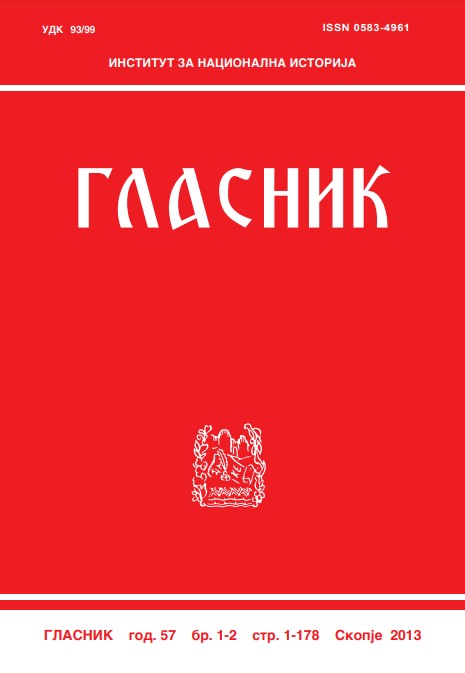ЦРКОВНИТЕ ПРЕТСТАВНИЦИ ВО ВИЗАНТИСКАТА ДИПЛОМАТИЈА НА БАЛКАНОТ ВО ТЕКОТ НА X ВЕК
CHURCH REPRESENTATIVES IN BYZANTINE DIPLOMACY IN THE BALKANS DURING THE X CENTURY
Author(s): Dragan ǴalevskiSubject(s): Local History / Microhistory, Middle Ages, Eastern Orthodoxy, History of Religion
Published by: Институт за национална историја
Keywords: Byzantine Empire; Church officials; Episcope; Monks; Byzantine diplomacy; Envoy; Balkans; Tenth Century
Summary/Abstract: Christianity played a very important role in shaping the Byzantine Empire and its civilization. It was deeply incorporated in all areas of Byzantine society and had a great impact not only on the imperial ideology and economy but also on diplomatic relations with neighbouring peoples. Because of this, the church became an instrument by which the state maintained or renewed its imperial hegemony, thus turning the priests into agents for the state, serving the basileus in Constantinople. Although they were often involved in the foreign affairs of the imperial government through religious missions, this was not the only duty assigned to them by the state. Sources indicate that church officials were involved in broader political and diplomatic activity in the Balkans in the 10th century, including serving as ambassadors of the Byzantine ruler. This is also proof that Byzantine diplomacy did not always act spontaneously by enacting ad–hoc decisions but probably carried out its activities at least occasionally following prior consultation within an informal advisory body. It further implies that the people who were actively involved in the foreign affairs of the Byzantine Empire, at least during the 10th century, had a certain level of knowledge and skills and a capacity for strategic thinking, which of course was rudimentary seen from today’s point of view. The involvement of priests in solely diplomatic missions with clear political objectives, where their education and oratorical skills would be used to the utmost, and their complete exclusion from missions of a military character, is yet another example of how Byzantine diplomacy was implemented in the field, as well as a clear indication that some basic principles and methods did exist and were upheld by the imperial government during this process.
Journal: Гласник
- Issue Year: 57/2013
- Issue No: 1-2
- Page Range: 51-61
- Page Count: 11
- Language: Macedonian

